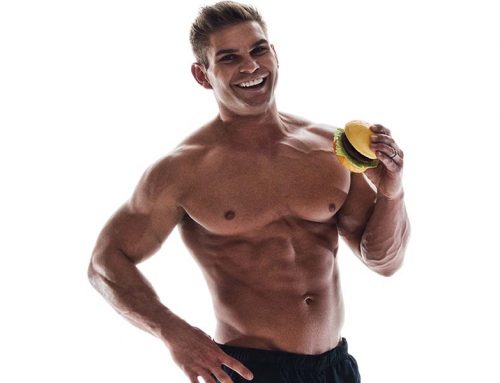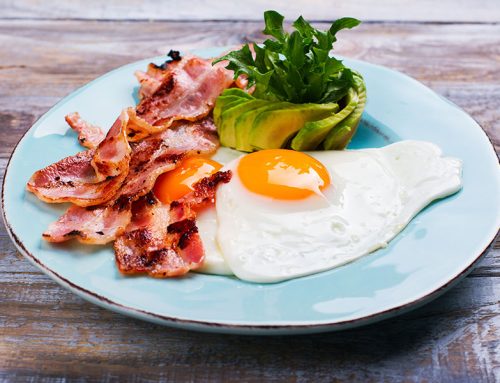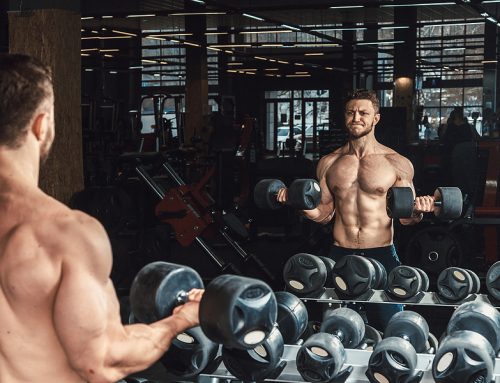How often should you eat protein if your goal is to maximize muscle gains? If you’ve been persuaded by trendy diets like intermittent fasting, you might think protein frequency and distribution don’t matter. “Just hit your protein goal for the whole day and you’re good.” This, unfortunately for muscle mass seekers, is false.
 If your goal is strictly weight loss, it’s true that protein timing is not as high a priority. But if your goal is gaining muscle size, eating too infrequently, taking prolonged fasts, or unevenly distributing your protein (for example, no protein at breakfast) can all hold back your gains.
If your goal is strictly weight loss, it’s true that protein timing is not as high a priority. But if your goal is gaining muscle size, eating too infrequently, taking prolonged fasts, or unevenly distributing your protein (for example, no protein at breakfast) can all hold back your gains.
Looking at how the most muscular bodybuilders eat is convincing (if you agree that decades of anecdotal evidence from the best in the world carries weight). And now new research has added more scientific evidence.
How Much Protein Per Meal?
Previous studies looked at how much protein you should eat per meal. Scientists have studied this from two angles – the protein per meal minimum and the protein per meal maximum.
“What’s the most protein you can digest in meal” is a common question. Actually, digestion is not the issue. All the protein you eat will be digested, if it’s a big bolus it will simply take longer. The issue is utilization. If there’s an overload of protein at one meal, not all of it can be used for muscle protein synthesis. The rest can still be used for other purposes in the body, or simply be oxidized, but you can’t build more muscle by cramming more protein into a single meal (if only it were that easy!)
Current evidence says that the most protein per meal likely to be used for muscle growth is 0.4g/kg/meal to 0.55g/kg/meal. For a 185 pound bodybuilder, that’s 46 grams.
Research also shows that the minimum per meal to stimulate protein synthesis is at least .24g/kg or about 20-25 grams. Ideal per meal protein intakes may be higher based on how intense the training is and a person’s body size. 20 – 25 grams may not be enough if it doesn’t help you hit a sufficient daily total (which is why 30 to 45 grams per meal is a more common target in bodybuilding diet plans).
How Much Protein Per Day?
In addition, the bulk of the evidence says that total daily protein intakes of 1.6g/kg to 2.2g/kg per day optimize muscle growth. Notice that the upper end of this range matches the classic bodybuilder rule of 1 gram per pound of total body weight per day. But also note that the low end is not an extravagant amount. Muscle gains can be achieved with less total daily protein than many people think, as long as all the other muscle growth factors are in place.
One point widely agreed on today is that the most important nutrition priority for muscle growth is to hit an optimal intake of protein for the whole day, and do that consistently, day after day. The total daily protein intake matters the most. But that doesn’t mean when you take in that protein (nutrient timing) isn’t a factor.
Put together, here’s what all the current research suggests: It’s not ideal to eat most of your daily protein in one huge meal, to eat only twice a day, or to have meals with only small amounts of protein (meals that are mostly carbs and or fat).
The ideal approach for protein distribution would be to spread it through the day across multiple meals in fairly equal amounts. Or at least be sure to get the minimum effective dose at each meal.
Protein Frequency: Eating 6 Times A Day Is Not Mandatory, But…
Classic bodybuilding philosophy has always called for eating protein as often as every three hours, and usually 5 to 6 times a day. The idea was to create a “slow drip of amino acids into the bloodstream.” While this general idea of spreading protein across the whole day still holds merit, exercise scientists have discovered that spreading out the protein doesn’t have to be taken to an extreme.
More meals is not always better. In fact, it’s possible to consume protein too often. Some lines of research suggest that there’s a “refractory period” for amino acids.
Here’s what this means: Suppose you eat protein at 6 pm with dinner, and then decide to eat protein again at 8 pm. If eating every 3 hours is what all the top bros do, then eating every 2 hours must be better, right?
What actually happens is that because you ate protein so recently, more protein so soon after does not stimulate muscle protein synthesis again. The muscles are simply not responsive to it yet (they’ve already had enough; the cup is full so to speak, and before having more it’s best to wait until it’s empty again).
The most recent studies, combined with the best mechanistic theory we can come up with, suggests that eating a sufficient dose of protein at least four times a day can optimize muscle growth. As few as three protein feedings a day may be satisfactory for the average trainee, provided total daily protein intake is high enough and the resistance training stimulus is strong enough.
What About Protein Timing?
Here’s a problem: Surveys show that when following a traditional three-meal breakfast, lunch, and dinner, most people don’t eat much protein at breakfast. It’s like a muffin, bagel, or doughnut with coffee as they fly out the door for work, or when there’s time to sit down it’s typically only cereal or pancakes, maybe some fruit. They get the majority of protein at night.
Scientists think that this skewed protein distribution may be a risk factor for muscle loss, and more so if total daily protein is too low. Even if the total daily protein goal is reached, and even if muscle is maintained, falling short on protein at breakfast (or any other meal) will not optimize muscle growth when gaining is the goal.
There’s been a trend in the diet world in recent years, where the pendulum has swung from “breakfast is the most important meal of the day” to “Nah, bro, doesn’t matter. Skip breakfast if you want; eat as few meals as you want. It makes no difference.” (It’s almost like a sort of “diet nihilism”). Some go as far as claiming that fewer meals is better. There are even people claiming that one meal a day is the best (it’s true – the “OMAD” diet is a thing).
Many people do report better weight loss when they reduce the number of meals they eat. It doesn’t take a rocket scientist to figure out that as long as there’s no compensation at other meals, no hunger problems are created, and the meal plan is sustainable, if you drop out a meal, you’re eating fewer calories. So weight loss should be no surprise. But in this case, fewer meals is simply an alternative way to achieve a calorie deficit, not a superior way.
And remember, weight loss and muscle gain are two different endeavors that call for different approaches. You may see reports that people successfully lost weight with time-restricted feeding and only two meals a day. You may even see evidence that they did it without losing muscle.
But there’s no evidence that this low of a protein intake frequency is better for muscle gains – the science says the opposite. In fact, even if you eat 3 times a day, if you fall short in protein at any of those meals (like a breakfast that’s all carbs), your muscle gains are diminished.
A new study just demonstrated this. It examined whether having adequate protein at breakfast would be more effective at increasing muscle mass during a 12-week weight training program, compared to the typical protein intake with more skewed toward diner. The study also tested how the protein pattern affected strength gains.
The New Study: What The Researchers Did
33 healthy men between 18 and 26 years old were recruited and split into two groups – a high protein breakfast group and a low protein breakfast group. The high protein breakfast group received an adequate protein amount at all three meals, while the lower protein group had inadequate protein at breakfast with a much bigger intake at dinner.
In the low protein group, the subjects ate only 8 grams of protein, an amount too low to stimulate muscle protein synthesis. The majority of the protein was consumed at dinner (55g). In the high protein group, 23 grams of protein was consumed at breakfast with the rest evenly distributed between lunch and dinner.
Note that 23 grams of protein is still low compared to how much most strength athletes and bodybuilders eat per meal, but it does cross the minimum threshold found to stimulate muscle protein synthesis.
In addition to the diet protocol, which was 12 weeks long, all the subjects in both groups followed a supervised weight training program three days a week.
At the end of the study, the differences in strength were not very large, but the high protein breakfast group had slightly better results in every exercise tested.
The high protein breakfast group also increased lean body mass more than the low protein group. It wasn’t a large difference – only 1.75 pounds more – but given how slowly muscle is typically built, many people would consider that of practical significance especially when stacked on top of the strength gains.
The researchers concluded that having inadequate protein at any meal, especially breakfast, adversely affects muscle protein synthesis and limits muscle growth.
Study Limitations
The results of this research do need to be interpreted with some caution, because there were limitations as there are in nearly every study.
One issue is that the subjects were allowed to choose the time of their workouts – morning or afternoon. This could have influenced the results because we know that protein timing around resistance training – especially afterwards – can improve muscle growth.
Nutrient timing (the post workout “window of opportunity”) was put on a pedestal for many years. Later, the pendulum swung the other way and it was downplayed or called unimportant. The truth lies more in the middle. When it comes to protein intake in relation to lifting, timing does matter and can influence results. Future studies should account for this.
Another problem is that the total amount of protein consumed for the day was not optimal. During resistance training when hypertrophy is the goal, the bare minimum of total daily protein should be 1.6g per kg but in both groups the subjects in this study were only taking in 1.3 and 1.45g/kg. Future research should make sure protein is in the optimal range for resistance trained athletes.
This is a salient point because it may explain how it’s possible that in one study on intermittent fasting, muscle growth in subjects who ate breakfast was not any better than the group that skipped breakfast. Even though the time-restricted group squeezed all their meals into an 8-hour window, the difference was their total protein for the day was optimized.
Yet another limitation is that the subjects in this study were untrained. We don’t know if results would be similar in experienced lifters or in other populations (older, women, and so on). Trained lifters gain muscle even slower, so perhaps the muscle gain difference would be even smaller.
What This Means To You
Despite the limitations, the results of this new study build on previous research. It gives us insights in more than one area, including total daily protein needs, protein requirements per meal, protein timing, as well as meal frequency.
Meal frequency has been a contentious topic, in terms of its effect on both fat loss and muscle gain. Theoretically, it makes sense that the more intakes of protein there are each day, the more separate opportunities there are for a spike in muscle protein synthesis. But there’s no evidence that the classic bodybuilding approach of 6 meals a day is necessary to optimize muscle growth, though there’s no reason not to eat that often if that’s your preference.
Many bodybuilders today continue to eat 5 or even 6 times a day, often because they are big, they train with high volume and intensity, and need multiple meals to easily hit total daily calorie and protein goals. However, the evidence today shows that there’s minimal difference between getting protein 4 or 5 times a day. We can also hypothesize that 4 protein feedings may only be slightly better than 3 when everything else in the diet and training is optimized.
When eating only 3 times a day however, it starts getting more important to spread protein fairly evenly across those meals and to be extra careful to hit your optimal daily protein goal. An advantage of eating more meals is that it usually makes it easier to hit the total daily protein target (and the daily calorie target, when a surplus is required). This is another reason so many bodybuilders still prefer to eat 4 to 6 times a day.
Here’s an interesting tidbit about what the best natural bodybuilders in the world do – and I’m not talking about 1990, I’m talking about now…
In 2018, a study was published in the Journal of the International Society of Sports Nutrition. It examined the dieting practices in a cohort of 51 high level drug-free bodybuilders who were successful in competition (placing in the top 5). The average number of meals eaten per day in both men and women was 6. There was also a trend for consuming more meals in male competitors who placed higher. Keep in mind this is a unique population of athletes who want to optimize results and for whom little details make a difference.
It’s possible to gain muscle when eating protein less than three times a day – we’re not saying you can’t. And it’s not that hard to maintain the muscle you already have. As long as you’re resistance training and hitting your daily protein goal, muscle loss is rarely an issue. But it’s easier to lose weight while maintaining lean mass than it is to gain new muscle tissue.
If weight loss is your primary goal, and you’re not a bodybuilder, protein timing and frequency may not be as important. But skipping breakfast, eating a carbohydrate-only breakfast, or leaving long gaps between meals (prolonged fasting) is not optimal when muscle building is your objective. There’s nothing anabolic about not eating.
This new study and similar research on protein distribution shouldn’t be used to dismiss intermittent fasting diets for weight loss if that’s a person’s choice. But you have to be cautious in assuming that fasting or a low meal frequency is a good idea (let alone superior) for building muscle. It’s always important to structure your meal plan according to your goals.
Conclusion
The results of this newest study add to the body of evidence that adequate total daily protein intake is more important than the number of meals, timing of meals, or the distribution of protein across the meals.
However, if you want to maximize your muscle gains to the greatest degree possible, the timing and distribution of protein matters. There are advantages to aiming for at least 3, and preferably 4 to 5 meals spread throughout the day, with a sufficient dose of protein at every meal.
Large resistance-trained athletes with high calorie needs will probably benefit the most from more frequent meals and protein intakes. Eating protein only once or twice a day is not going to maximize muscle gains.
-Tom Venuto,
Founder, Burn the Fat Inner Circle
Author, Burn the Fat, Feed the Muscle
Scientific References:
Yasuda J et al, Evenly Distributed Protein Intake over 3 Meals Augments Resistance Exercise–Induced Muscle Hypertrophy in Healthy Young Men, The Journal of Nutrition, 150:7, 1845–1851. July 2020.
Chappell AJ, et al, Nutritional strategies of high level natural bodybuilders during competition preparation, Journal of the International Society of Sports Nutrition 15:4. 2018.
Schoenfeld B, Aragon A, How much protein can the body use in a single meal for muscle-building? Implications for daily protein distribution. Journal of the International Society of Sports Nutrition, 15:10, 2018.







Excellent post….. learned a lot
James, thanks for posting; glad you found it informative.
This was great!! Exactly what I needed
Hey Tom, I’m curious if any similar studies or recommendations exist for minimum/maximum grams of carbs and fat per meal? Love your work, great article thanks!
I recently wrote an article related to this topic – “How many grams of carbohydrates can you eat per meal without storing fat?” Its posted on in the members area now, b ut since you mentioned it, it would be a good one to share with everyone stand by for upcoming blog post (summary: It depends, BIG TIME – optimal carb intakes can vary drastically from person to person based on body size and activity level and goals)
Hello Mr. Venuto Just Want To Say Thank You For All The Great Information You Provide To Us. Every Post Matters To Someone. Thanks For Always Providing Multiple Options And Never Backing Us Into A Corner By Saying “One Size Fits All”
I Had Never Purchased A Book Online Before, But I’m So Glad I Purchased “Burn The Fat Feed The Muscle” Years Ago. It’s Still The Ultimate Fitness Book, and When Needed, Reference Guide. Wishing You All The Best, GOD Bless!!!
Thanks Jimmie!